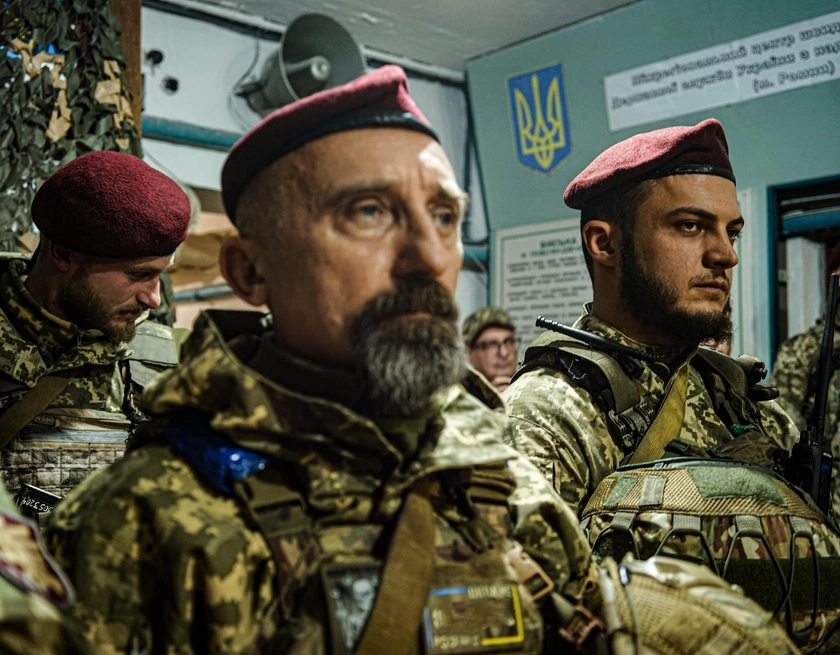Russia invaded neighboring Ukraine on Feb. 24, sparking the worst conflict in Europe in decades.
Thousands of civilians have been killed in the war, which has been marked by multiple setbacks for Russian forces in the face of an epic fightback by Ukraine.
JOIN US ON TELEGRAM
Follow our coverage of the war on the @Kyivpost_official.
Here is a timeline of the main developments:
- February 2022: invasion -
Russian President Vladimir Putin announces a “special military operation” in Ukraine on Feb. 24.
- Find the most up-to-date war in ukraine update in the Kyiv Post's daily news items for today.
- Get the newest Ukraine news reports as of today.
He says this is to protect the Russian-speaking, self-declared separatist republics of Luhansk and Donetsk in the east of Ukraine, whose independence he has just recognized.
He says he wants to “de-Nazify” Ukraine, a former Soviet republic, and demands a guarantee it will never join the NATO military alliance.
A full-scale invasion starts, with missile strikes on several Ukrainian cities.
Ukrainian President Volodymyr Zelensky stays in the capital Kyiv to lead the resistance.
The West imposes unprecedented sanctions on Russia. The European Union and United States send weapons to Ukraine. The aid pledged by Washington rises into the billions as the months pass.
- March: advances in south but Kyiv holds -
Russian troops attack Ukraine’s south coast, seizing the city of Kherson, close to the Crimean Peninsula, which Moscow annexed in 2014.
Russian forces also attempt to surround Kyiv and take Ukraine’s second city Kharkiv in the northeast but meet fierce resistance and major logistical difficulties.

Americans Fighting in Ukraine Criticize Trump’s Treatment of Zelensky, Embrace of Russia
A month into the fighting, Russia withdraws from the Kyiv area and the north to focus on the eastern industrial Donbas region (Lugansk and Donetsk), partly held by separatists, along with the south.
- April: war crimes revealed -
In early April, scores of corpses of murdered civilians are discovered in Kyiv suburbs and northern towns that Russian forces had occupied.
The discoveries spark an international outcry.
- May: Mariupol falls -
On May 21, Russia announces the fall of the strategic southeastern port city of Mariupol, which had been relentlessly bombed since the start of the war.
Ukrainian troops, who had held out for weeks at a steelworks in the city, surrender.
Sweden and Finland request membership of NATO, fearing they could be future targets of Russian aggression.
- June: Donbas battle rages -
In June, Russia takes the Donbas city of Severodonetsk after one of the bloodiest battles of the war, followed soon after by the neighboring city of Lysychansk.
Ukraine pleads for more heavy weapons from the West.
- July: grain unblocked, gas supplies cut -
On July 22, Kyiv and Moscow sign a deal to resume grain exports from Ukraine, in a bid to relieve a food crisis aggravated by Russia’s blockade of the country’s ports.
Russian gas giant Gazprom slashes its supply to Europe through the Nord Stream pipeline, fuelling fears of gas shortages in Europe.
- August: nuclear fears -
Ukraine and Russia blame each other for shelling around the Russian-occupied Zaporizhzhia nuclear power plant and Kyiv launches a major offensive to retake Kherson.
- September: annexation -
Ukraine retakes hundreds of towns and villages in a lightning counter-offensive around Kharkiv.
On Sep. 21, Putin launches a partial draft of 300,000 reservists, sparking an exodus of young Russian men of military age to neighbouring countries.
Between Sep. 23 and 27, Kremlin-backed authorities hold hasty referendums in the Moscow-held Ukrainian regions of Lugansk, Donetsk, Kherson and Zaporizhzhia on joining Russia.
The votes, in which the Kremlin claims victory, are dismissed by Kyiv and the West as a sham.
On Sep. 30, Putin formally annexes the four regions.
- October: energy infrastructure pounded -
On October 8, Ukrainians celebrate after an explosion causes major damage to a bridge linking Crimea to the Russian mainland -- a symbol of Moscow’s annexation of the peninsula.
Putin blames Ukrainian secret services for the attack.
Russian forces retaliate with a barrage of strikes on energy infrastructure in Kyiv and other cities, leaving millions without power in what becomes its new modus operandi throughout the winter.
- November: retreat from Kherson -
On Nov. 9, Moscow orders its troops to retreat from Kherson in the face of advancing Ukrainian forces, marking a stunning defeat in one of the regions it annexed.
- December: Zelensky goes to Washington -
On Dec. 22, Zelensky visits Washington on his first overseas trip since the war began. He keeps on his trademark fatigues for a meeting with President Joe Biden and a historic address to Congress.
- January 2023: bloody New Year, ceasefire -
Russia suffers its biggest single loss of life since the invasion began in an attack on a temporary base in the eastern town of Makiivka on Jan. 1. Moscow says 89 soldiers were killed but Ukraine’s military says nearly 400 lost their lives in the attack which leads to rare displays of public grief in Russia.
On Jan. 5, Putin orders a temporary ceasefire in Ukraine on Orthodox Christmas on Jan. 6-7. Ukrainian presidential adviser Mykhailo Podolyak rejects the move as “hypocrisy” and “propaganda.”
You can also highlight the text and press Ctrl + Enter











